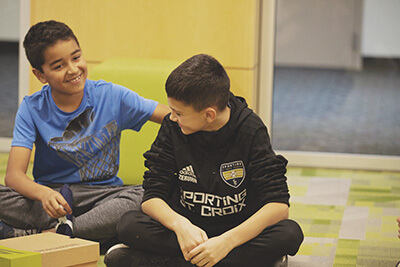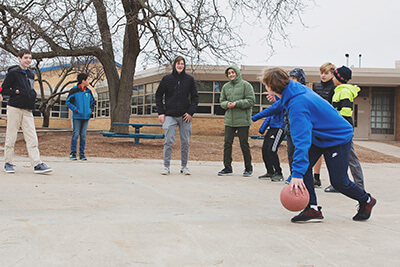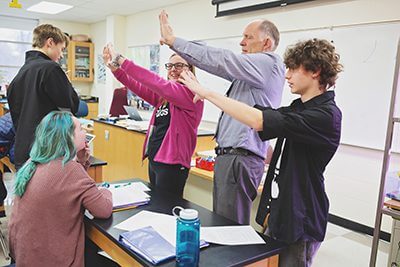January 3, 2019
by Renee Wright, Lower School Director
Editor’s Note: On the first Thursday of each month, you will find a guest blog post here from one of MPA’s division directors. We hope you will enjoy reading their thoughts and reflections about life at MPA.
“It is time to warm up our bodies and brains and get ready for a new week of learning.” These words are spoken every Monday morning at the start of the Lower School Meeting, right before students and teachers participate in the “BrainDance.” Developed by Anne Green Gilbert, an educator and author who founded the Creative Dance Center in Seattle, the BrainDance is a series of exercises and developmental movement patterns that prepare students for learning, promote appropriate behaviors, and develop social skills. This is just one way that MPA teachers promote movement to enhance learning.
What does research tell us about the relationship between movement and the brain? Prior to 1995, researchers believed that the health benefits of exercise were limited to the body. Recent research has shown, however, that regular physical activity and movement benefit more than just the body—they actually augment brain function. Movement supplies brain cells with oxygen, promotes the production of new brain cells, and aids in creating new synapses. In experiments at the University of Illinois, rats that exercised had a greater number of neuron connections than non-exercising rats (Greenough & Anderson, 1991). Movement triggers the release of a brain-derived neurotrophic factor known as BDNF (Kesslak, Patrick, So, Cotman, & Gomez-Pinilla, 1998). This natural substance enhances cognition by boosting a neuron’s ability to communicate with other neurons. Movement also increases energy, reduces stress, and calms the mind and body. Research shows that exercise may stimulate the production of brain chemicals norepinephrine and dopamine, which energize and elevate mood (Chaouloff, 1989). In addition, studies link movement to better memory and reduced likelihood of depression (Kempermann, 2002). Other research studies reveal that exercise improves classroom behavior, academic performance, and social skills (Dwyer, Sallis, Blizzard, Lazarus, & Dean, 2001). As a result of multiple research studies, schools now understand that students learn better, behave better, and are socially more successful when they have physical activity and movement breaks throughout the school day.
Read More
 by Dr. Bill Hudson, Head of School
by Dr. Bill Hudson, Head of School


 by Dr. Bill Hudson, Head of School
by Dr. Bill Hudson, Head of School by Mark Segal, Upper School Director
by Mark Segal, Upper School Director by Dr. Bill Hudson, Head of School
by Dr. Bill Hudson, Head of School by Dr. Bill Hudson, Head of School
by Dr. Bill Hudson, Head of School by Dr. Bill Hudson, Head of School
by Dr. Bill Hudson, Head of School by Jenn Milam, Ph.D., Middle School Director
by Jenn Milam, Ph.D., Middle School Director